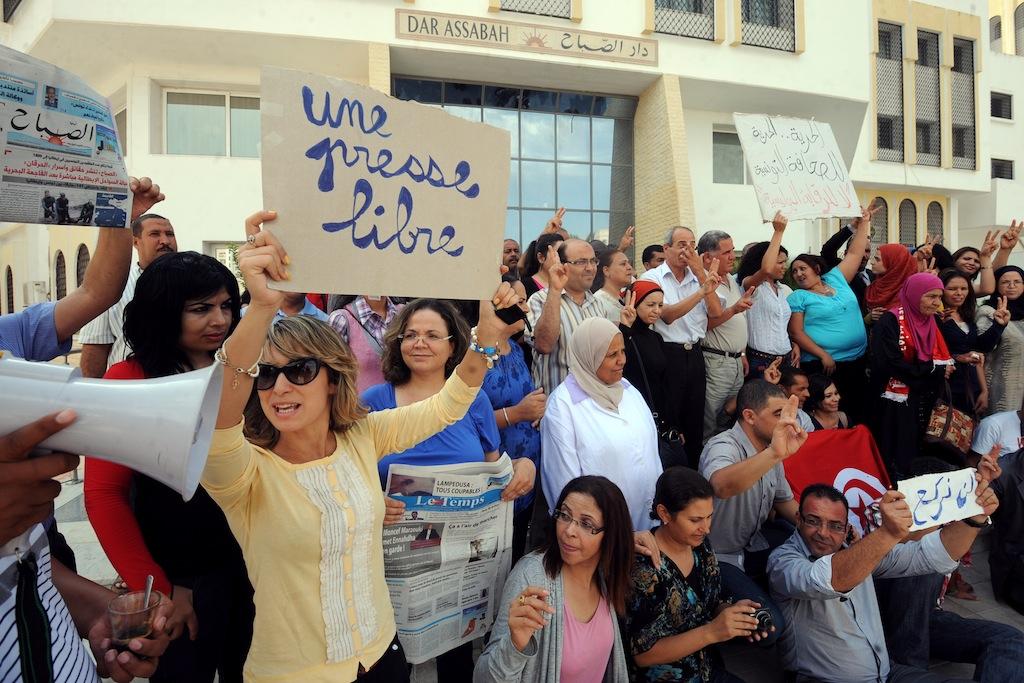Tunisia struggles with press freedom on one-year anniversary of democratic elections
Tunisian journalists of Assabah Daily hold signs calling for freedom of the press during a protest in Tunis on September 11, 2012. Since the government appointed overseers for the country’s media outlets, journalists have held a number of protests and recently had a general strike.
A year into the first term of Tunisia's democratically elected government, many rights groups are worried that the National Constituent Assembly (NCA), elected a year ago yesterday, isn't doing enough to ensure press freedoms.
Journalists across the country went on strike last week, said the National Tunisian Journalists Union (SNJT), to protest the government's appointments of moderators that stifle reporting critical of the new administration.
Protests took place in front of union headquarters, and the SNJT reported 90 percent member participation.
France24 reported that even state media, such as Tunisian public radio, posted versions of their logos with a black band running though them and the slogan: "General strike by journalists: the freedom of the press and the rights of citizens." Many protesters covered their mouths with tape that said "Censorship."
In August, the government appointed a former police commissioner, Lotfi Touati, as the head of the country's oldest and largest media group, Dar Assabah. The move was denounced by the SNJT and after continued complaints about Touati and other appointees, a strike was called.
Touati, in addition to censoring articles, firing journalists, and publishing a list of the people allowed to write editorials, may even also be guilty of attempted murder of a reporter.
More from GlobalPost: Protesters in Tunisia say draft constitution erodes women's rights
According to the Committee to Protect Journalists (CPJ), "on September 13, a car driven by Touati struck Khalil Hannachi, a reporter for Assabah, according to news reports. Hannachi was outside the Dar Assabah headquarters in the capital, Tunis, waiting to confront Touati about recent decisions he had made regarding the media group and its newspapers, news reports said. News accounts citing a witness reported that Touati started his car and 'moved ahead at full speed.'"
Kamel Labidi, former CPJ consultant, veteran journalist, and human rights defender told CPJ reporter Dahlia El Zein, "the government appointed these individuals not based on any media experience or criteria, but because of their alignment with the ruling Ennahda party."
Amnesty International yesterday published a report on a number of issues facing the new Tunisian government, from ill treatment of prisoners to women's rights. One Step Forward, Two Steps Back also focuses a chapter on the country's on-going struggle with freedom of expression, specifically in the news media, and echoes the SNJT's fear of government appointees.
"The new Tunisian authorities… have resorted to old, repressive tactics to target journalists, bloggers, artists and critics under the guise of maintaining public order and public morals," said Amnesty's report.
There are new laws regarding the media that were written for Tunisia's new constitution, but the Islamist-led coalition government has not followed through with enforcing them.
More from GlobalPost: Turkey targeting journalists and pro-Kurdish media
Decree 115 clarifies the rights of journalists and prohibits "restrictions on the freedom to disseminate information" and Decree 116 stipulates the creation of an independent authority to guarantee "the freedom of audiovisual communication," and be charged with issuing radio and television licenses.
In its statement concerning the strikes last week, the government said it was open to dialogue, "to respond positively to all the issues involving the information sector, and those which concern the social situation in certain media establishments," reported AFP. The official state news agency also reported that "The coalition government has decided to implement decrees 115 and 116 regulating the information sector."
With the strikes over and the government heading into it's second year, after a successful and mostly peaceful transition, many hope Tunisia will take the path toward implementing these freedoms.
“Tunisia is at a crossroads. The authorities need to seize this historic opportunity and confront the painful legacy of abuse and violations of the past and enshrine in law and in practice universal human rights with the aim of making the rule of law a reality in the new Tunisia," said Hadj Sahraoui, Deputy Director of the Middle East and North Africa Programme at Amnesty International.
Our coverage reaches millions each week, but only a small fraction of listeners contribute to sustain our program. We still need 224 more people to donate $100 or $10/monthly to unlock our $67,000 match. Will you help us get there today?
